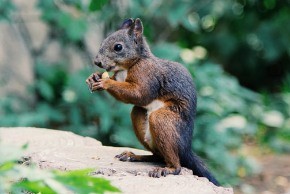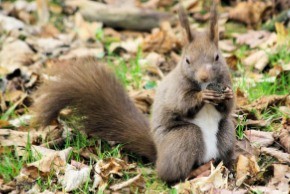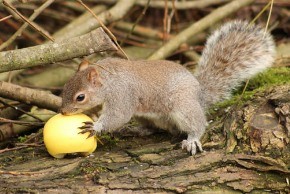Can Squirrels Eat Salted Peanuts? Well, squirrels have a natural appetite for nuts and berries, as well as other plants in their habitat. Please avoid feeding them salted nuts of any kind.
While squirrels can tolerate a small amount of salt, their kidneys cannot filter out the large amount of sodium contained in salted nuts.
If you are unsure whether peanuts, pecans, hazelnuts, almonds, or walnuts are salted, taste them yourself before feeding them. Because I mentioned they can handle a tiny bit of salt, but you don’t want to feed them too much.
There are several things you need to know before you start feeding your garden squirrels. Number one is you need to understand the benefits different foods have on a squirrel’s mind and body.
Some additional foods other than nuts are also needed to provide them with a more balanced diet.
These supplementary foods include carrots, pecans, and in most cases, peanuts and peanut butter.
Peanuts are considered one of the favorite snacks all over the world. Squirrels also eat and enjoy peanuts, but are they good for them? How about raw, roasted, or salted peanuts? What are the benefits of feeding peanuts to squirrels, and are there any health risks? Let’s take a closer look.
Are Peanuts Good for Squirrels?

A healthy diet for a squirrel consists of a variety of things like fresh vegetables, wild foods from outdoors, and limited amounts of nuts and treats. Peanuts are a fun treat to feed and a great way to help with the bonding process, but they should only be fed in limited amounts after they have eaten healthy foods.
Squirrels are not particularly picky when it comes to their diet selection. And choosing peanuts as their diet seems like a no-brainer for squirrels. But unlike most people assume, peanuts are not nuts but legumes. They are more closely related to soy, beans, and lentils.
As peanuts offer very little nutritional value for squirrels. So feed them healthy foods first and use peanuts only as a fun treat to bond with the wildlife in your backyard. If you are going to feed them peanuts, do it occasionally as a snack to vary their diet.
Before we get into the health risks of feeding peanuts to squirrels, let’s have a look at the different types of peanuts available commercially and their nutritional facts.
What are the Different Types of Peanuts?
The four types of peanuts used most commonly are Runner, Virginia, Spanish, and Valencia. Each comes with its distinctive size, flavor, and nutritional value. Within these four types, there are several varieties used for commercial cultivation.
1. Runner Peanuts
These are the most popular and widely consumed. Runner Peanuts have a delicious flavor and great aroma. Their uniform kernel size ensures even roasting and is used to make peanut butter.
Runner peanuts give a maximum yield in a warm climate and well-drained sandy soil. They are typically grown in the states of Georgia, Texas, Alabama, Florida, South Carolina, and Oklahoma.
2. Virginia Peanuts
Virginia peanut is the largest of all the peanuts and is also called the “ballpark” peanut or “the cocktail nuts”. Its larger size makes it ideal for processing, especially for salting, confections, and in-shell roasting.
Virginia Peanuts are grown mainly in southeastern Virginia and northeastern North Carolina. They are also found in some parts of South Carolina and West Texas.
3. Spanish Peanuts
Spanish peanut has smaller-sized kernels and is known for its reddish-brown skins. These are mostly used in peanut candies, peanut snacks, salted peanuts, and peanut butter.
Spanish peanuts have a higher oil content than the other types of peanuts, which makes them excellent for extracting oil. They are grown primarily in Oklahoma and Texas.
4. Valencia Peanuts
Valencia peanuts have three or more kernels per shell. These are also the sweetest among the four types.
They are popularly sold in the shell and are used to make peanut butter. They are also served roasted or boiled. Most of the valencia peanuts production occurs in New Mexico.
Do Peanuts Have Any Nutritional Value?

Despite having a ‘nut’ in their name, peanuts are not related to the nut tree. They are a legume and are related to beans, soy, and lentils.
Peanuts are very high in fats, most of which are mono and polyunsaturated fatty acids. Hence, they are used mostly in the extraction of peanut butter.
They are a great source of plant-based proteins. But like some plant-based proteins, peanuts can cause an allergic reaction in humans and animals including squirrels.
Carbs in peanuts are very low, therefore they have a low glycemic index.
Peanuts also contain plenty of potassium, phosphorous, magnesium, copper, and manganese. Also, B-vitamins are found abundantly in peanuts.
Peanut comes in various forms like raw, salted, spiced, roasted, and more. Keep in mind that nutritional values vary with each type may not be squirrel-friendly.
Can Squirrels Eat Salted Peanuts?
Salted food of any kind is harmful to squirrels and rabbits. Squirrels do require a little bit of sodium to properly maintain their electrolyte balance. However, high salt content harmfully impacts the kidney’s function and can lead to kidney disease.
If you are unsure, if the peanuts you bought are salted, taste them before feeding squirrels. But remember to have fresh water available to the squirrels.
Can Squirrels Eat Raw Peanuts?
Raw peanuts aren’t safe for squirrels for several reasons. Although these are not toxic, peanuts are grown underground. During harvesting, they may be contaminated with Aspergillus flavus, a mold that produces a carcinogen known as aflatoxin. This toxin also causes liver failure and liver cancer.
According to a study by the Department of Nutrition and Food Science, MIT, aflatoxins are a known cause of liver cancer, compromised immunity, poor protein metabolism, and death in animals.
Roasting or cooking peanuts removes some of the toxins, but aflatoxin remains intact even at relatively high temperatures.
Peanuts also contain a trypsin inhibitor, which interferes with the production of trypsin in the pancreas. This enzyme plays a crucial role in protein reabsorption.
So in short you should never feed squirrels raw peanuts.
Can Squirrels Eat Dry Roasted Peanuts?
Peanuts whether raw, roasted, or salted, is always a reason for concern among animal lovers. The important question is: does roasting destroy toxins on peanuts? Experts believe that roasting doesn’t destroy the toxins completely.
Another concerning point is that roasted peanuts come in two types: dry roasted and oil roasted. The dry roasted ones have more sodium content, whereas the oil roasted peanuts are high in calories.
So, dry roasted peanuts aren’t good for squirrels either.
Can Squirrels Eat Peanut Butter?
Peanut butter, like peanuts themselves, is also dangerous for squirrels.
No products found.
Peanut butter may also contain aflatoxins, that can cause liver diseases, impaired blood clotting compromised immunity, protein synthesis, and even cancer.
Another toxic substance is trans-fatty acids. Peanut butter is made through hydrogenation, a process that makes food more stable and extends the shelf life. But in reality, this can be a cause of chronic diseases including diabetes and heart diseases. That means you should avoid feeding squirrels peanut butter.
Most peanut butter contains xylitol or sugar. They are toxic to squirrels and even small amounts can be fatal.
Some peanut butter brands also contain chocolate as one of the ingredients and, these should be avoided.
Glyphosate is another toxic substance found in herbicides. This is also used as a pre-harvest spray by peanut farmers. When sprayed right before harvest, plants absorb this chemical quite faster, and washing it entirely off the plant or nuts is impossible. This is another reason why you shouldn’t give peanut butter to squirrels.
Another dangerous ingredient potentially present in peanut butter is a lectin. Lectin causes inflammatory responses in squirrels. They affect gut cells and cause leaky gut. Legumes contain the highest lectin of any food group and therefore are bad for squirrels.
With so many risks, it’s advisable not to give peanut butter to squirrels.
Why are the Health Risks of Feeding Peanuts To Squirrels?
There are many reasons why peanuts are extremely bad for squirrels.
- The nuts pose a choking hazard when swallowed or may cause gastrointestinal obstruction in baby squirrels.
- Peanuts are high in fat content and giving squirrels for longer periods, can cause pancreatic problems.
- Salted peanuts are very high in sodium for squirrels, and flavored peanut brands comprise mostly fillers and products that aren’t healthy for squirrel’s gut. Too much salt affects their kidney function as well.
- It is also important to note that peanuts are a common allergen, for humans and squirrels alike. And some squirrels can develop severe allergic reactions.
- Even though squirrels love peanut and corn, but in reality, they fail to provide them with any real nutritional value. That being said, it is fine to feed them these foods, but you should do so in small amounts.
- Much better options are tree nuts like walnuts, almonds, and hazelnuts. Salt and sugar can be especially harmful to squirrels and should be avoided.
Do Squirrels Like To Eat Peanuts?
Squirrels do find the taste of peanuts very appealing. If you closely observe them, chances are good that you can spot them bustling around in the branches or on the ground, with peanuts that they will store for later.
Shelled peanuts are the most preferable for almost all squirrel types. Besides giving them a chewing exercise, shelled peanut gives some nutrients for them. However, have in mind the peanuts aren’t healthy and you should never prioritize them over small insects, fruits, seeds, and fungi.
.
Do Squirrels Have Any Peanut Allergies?
Like humans, squirrels can have peanut allergies. Although animals rarely have peanut allergies it is still a good idea to be careful and aware of symptoms.
Peanut allergies are usually mild. Symptoms include
- Reddened skin
- Itching
- Agitation
- In severe cases, difficulty breathing
Remember that squirrels are just like other wild animals and will eat anything that they can get their little hands on. They are well adapted to scavenge for food. While it seems like a kind gesture to feed them, you might not be doing them any favor. Especially if you overfeed them or give them human foods.
In other words, human food items could be lethal to squirrels as their digestive system doesn’t work like ours.
That being said, it’s okay to give them some of their favorite treats from time to time. This includes pecans or peanuts. But remember to only give them unsweetened, unshelled, and unsalted peanuts occasionally. Fill the feeder with the right foods that provide all essential nutrients to them.
What Are The Best Foods for Squirrels?
No products found.
Wild squirrels are not picky eaters and will eat anything that nature provides them. Some of their most favorite foods include peanuts, pistachios, grapes, pecans, and other foods that they love to eat.
Just remember to allow them to forage for their foods, which include seeds, nuts, fruits, small insects, and fungi.
They need a variety of different food items to maintain a healthy well-balanced diet. On average squirrels usually consume about one pound of food per week. So make sure that you are not feeding them sugary or salty foods and filling the squirrel feeder with the right foods that provide them with the proper nutrition.
Conclusion

Feeding wild squirrels can be an extremely relaxing and fulfilling activity. However, learning about the correct foods to give to squirrels is extremely important, especially for their safety.
Squirrels are not picky when it comes to food. They will eat whatever they think is a potential meal.
So feeding squirrels is a good thing but you need to use favorite and healthy foods that they love to eat.
However, remember to allow squirrels to forage for their foods including fruits, small insects, seeds, and fungi. Choose a variety of well-balanced diets to maintain squirrel health.
Avoid giving them salty or sugary foods, instead, fill their feeder with the right foods that provide proper nutritional value.
Last update on 2023-07-31 / Affiliate links / Images from Amazon Product Advertising API
